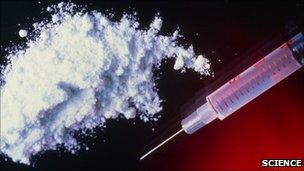Scottish drug deaths drop for second year in row
- Published

Official figures show there were 485 drug-related deaths in 2010
The number of people dying from drug misuse in Scotland has fallen for the second year in a row.
Figures from the Registrar General for Scotland, external show an 11% drop. There were 485 deaths in 2010, down from the previous year's figure of 545.
But some critics have argued that the number could be even higher if all drug-related deaths were included.
It is estimated the number of deaths from drug-acquired hepatitis C could reach 200, by 2015.
However, these statistics will not be included in official drugs death figures.
Although down, the figures for deaths from drug misuse are the third highest recorded.
Three quarters of the 485 drug deaths were men and 33% were aged between 25 and 34.
Heroin and morphine were implicated in more than half the deaths. Methadone, the heroin substitute, was a contributor in 174 deaths.
Benzodiazepines, such as diazepam, were involved in 154 deaths and cocaine was linked to 33 deaths. Amphetamines were implicated in three of the deaths.
Innovative treatments
In 2010 there were no deaths where ecstasy was involved. Alcohol was a contributor in 127 deaths.
The health board area where the most drug misuse deaths occurred was NHS Greater Glasgow and Clyde, which accounted for 34% of the deaths.
The Scottish government said the drop in deaths was evidence its drugs strategy was working and more lives were being saved.
Minister for Community Safety, Roseanna Cunningham, said: "These figures represent 485 lives lost to families and communities across Scotland and while I welcome the news of a further decrease, any death is one too many.
"Tackling drugs misuse is a complex issue which the Scottish government has been working hard to address. It is clear serious drug misuse remains a significant problem.
"However, our national drugs strategy offers a framework to tackle Scotland's legacy of drug misuse through action, not through words."
Ms Cunningham was speaking on a visit to a drug treatment facility in Perth. She said ministers were investing £28.6m in programmes to help addicts.
The increasing use of naloxone, a drug which can counteract the effects of opiate poisoning, is being credited with helping reduce the drug death rate.
A national programme is being rolled out within communities and the Scottish Prison Service, to supply naloxone kits and training to those at risk.
David Liddell, director of the Scottish Drugs Forum, said it was too early to say if the reduction in deaths was a long-term trend.
He said: "The biggest issue is that Scotland's death toll from drug problems remains unacceptably high. If you look at the rate of drug-related deaths among the drug using population, Scotland has similar rates to our European neighbours.
"But if you look at the rate of drug-related deaths compared to the overall population, Scottish people are seven times more likely to die from a drug-related death than their European counterparts.
"Today's figures show encouraging progress on reducing the numbers of deaths. However, there is no room for complacency."
The Liberal Democrats described the drug deaths figures as "sobering" and called for urgent action from the Scottish government.
The Conservatives pointed to the number of methdone related deaths and called for an expansion of the rehabilitation services on offer.
Labour welcomed the fall in deaths but said there needed to be better interface between the benefits system and the health service, so addicts on benefits get the support they need.
- Published30 March 2011
- Published19 January 2011
- Published17 August 2010